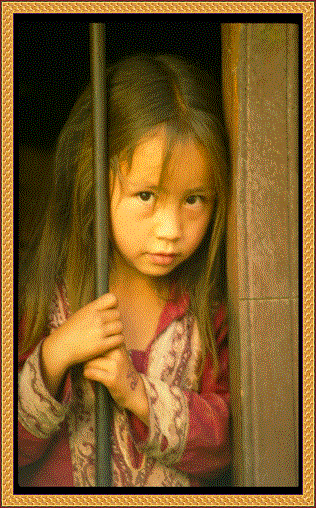There are many in our world who are starving
for the love and sympathy which should be given them. Many men
love their wives, but are too selfish to manifest it. They have
a false dignity and pride, and will not show their love by words
and deeds. There are many men who never know how starved is the
heart of the wife for words of tender appreciation and affection.
They bury their loved ones from their sight and murmur at the
providence of God that has deprived them of their companions,
when, could they look into the inner life of those companions,
they would see that their own course
was the cause of their premature death. The religion of Christ
will lead us to be kind and courteous and not so tenacious of
our opinions. We should die to self and esteem others better
than ourselves.
God's word is our standard, but how far
have His professed people departed from it! Our religious faith
must be not only theoretical, but practical. Pure and undefiled
religion will not allow us to trample upon the rights of the
least of God's creatures, much less of the members of His body
and the members of our own family. God is love, and whoso dwelleth
in Him dwelleth in love. The influence of worldly selfishness,
which is carried about by some like a cloud, chilling the very
atmosphere that others breathe, causes sickness of soul and frequently
chills to death.
It will be a great cross for you to cultivate
pure, unselfish love and disinterested benevolence. To yield
your opinions and ideas, to give up your judgment, and to follow
the counsel of others will be a great cross to you. The several
members of your family now have families of their own. But the
same spirit which existed to a greater or less extent in their
father's home is carried to their own firesides and is felt by
those outside of their family circles. They lack sweet simplicity,
Christlike tenderness, and unselfish love. They have a work to
do to overcome these selfish traits of character in order to
be fruitful branches of the True Vine. Said Christ: "Herein
is My Father glorified, that ye bear much fruit." You need
to bring Jesus near to you, to have Him in your homes and in
your hearts. You should not only have a knowledge of what is
right, but should practice it from right motives, having an eye
single to the glory of God. You may be helps, if you will comply
with the conditions given in the word of God.
The religion of Christ is something more
than talk. The righteousness of Christ consists in right actions
and good works from pure, unselfish motives. Outside righteousness,
while the inward adorning is wanting, will be of no avail. "This
then is the message which we have heard of Him, and
declare unto you, that God is light, and in
Him is no darkness at all. If we say that we have fellowship
with Him, and walk in darkness, we lie, and do not the truth:
but if we walk in the light, as He is in the light, we have fellowship
one with another, and the blood of Jesus Christ His Son cleanseth
us from all sin." If we have not the light and love of God
we are not His children. If we gather not with Christ we scatter
abroad. We all have an influence, and that influence is telling
upon the destiny of others for their present and future good
or for their eternal loss.
J and K both lack sympathy and love for
those outside of their own families. They are in danger of watching
to see defects in others while greater evils exist undiscerned
in themselves. If these dear souls ever enter heaven, they must
die to self and obtain an experience in well-doing. They have
lessons to learn in the school of Christ in order to perfect
Christian characters and have a oneness with Christ. Said Christ
to His disciples: "Except ye be converted, and become as
little children, ye shall not enter into the kingdom of heaven."
He explained His meaning to them. He did not wish them to become
children in understanding, but in malice. Little children do
not manifest feelings of superiority and aristocracy. They are
simple and natural in their appearance. Christ would have His
followers cultivate unaffected manners, that their whole bearing
may be humble and Christlike. He has made it our duty to live
for others' good. He came from the royal courts of heaven to
this world to show how great an interest He had in man, and the
infinite price paid for the redemption of man shows that man
is of so great value that Christ could sacrifice His riches and
honor in the royal courts to lift him from the degradation of
sin.

If the Majesty of heaven could do so much
to show His love for man, what ought not men to be willing to
do to help one another out of the pit of darkness and suffering!
Said Christ, "Love one another, as I have loved you;"
not with a greater love; for "greater love hath no man than
this, that a man lay down his life
for his friends." Our love is frequently selfish, for we
confine it to prescribed limits. When we come into close union
and fellowship with Christ, our love and sympathy and our works
of benevolence will reach down deeper and will widen and strengthen
with exercise. The love and interest of Christ's followers must
be as broad as the world. Those who live merely for "me
and mine" will fail of heaven. God calls upon you as a family
to cultivate love, to become less sensitive in regard to yourselves
and more sensitive to the griefs and trials of others. This selfish
spirit that you have cherished all your lives is correctly represented
by the priest and the Levite who passed by the unfortunate on
the other side. They saw that he needed help, but purposely avoided
him.
Each one of you needs to awake and face
square about to get out of the cart rut of selfishness. Improve
the short, probationary time given you by working with your might
to redeem the failures of your past life. God has placed you
in a world of suffering to prove you, to see if you will be found
worthy of the gift of eternal life. There are those all around
you who have woes, who need words of sympathy, love, and tenderness,
and our humble, pitying prayers. Some are suffering under the
iron hand of poverty, some with disease, and others with heartaches,
despondency, and gloom. Like Job, you should be eyes to the blind
and feet to the lame, and you should inquire into the cause which
you know not and search it out with the object in view to relieve
their necessities and help just where they most need help.
L needs to cultivate love for his wife,
love that will find expression in words and deeds. He should
cultivate tender affection. His wife has a sensitive, clinging
nature and needs to be cherished. Every word of tenderness, every
word of appreciation and affectionate encouragement, will be
remembered by her and will reflect back in blessings upon her
husband. His unsympathizing nature needs to be brought into close
contact with Christ, that that stiffness and cold reserve may
be subdued and softened by divine love. It will not be weakness
or a sacrifice of manhood and dignity to give
his wife expressions of tenderness and sympathy in words and
acts; and let it not end with the family circle, but extend to
those outside the family. L has a work to do for himself that
no one can do for him. He may grow strong in the Lord by bearing
burdens in His cause. His affection and love should be centered
upon Christ and heavenly things, and he should be forming a character
for everlasting life.
Dear K has very limited ideas of what constitutes
a Christian. She has freed herself from burdens which Christ
has borne for her. She is not willing to bear His cross and has
not exercised to the best account the ability, the talents, given
her of God. She has not grown strong in moral fortitude and courage,
nor felt the weight of individual responsibility. She has not
loved to bear reproach for Christ's sake, considering the promise:
"If ye be reproached for the name of Christ, happy are ye;
for the Spirit of glory and of God resteth upon you." "If
we suffer, we shall also reign with Him." The Master has
a work for each to do. None can be idle, none can be careless
and selfish, and yet perfect Christian character. He wants all
of your family to unclose their hearts to the benign influence
of His love and grace, that their compassion for others may overflow
the boundaries of self and the enclosures of family walls, as
did the Samaritan's to the poor, suffering stranger who was neglected
and left to die by the priest and the Levite. I was shown that
there are many who need our sympathy and advice; and when we
consider that we can pass through this world but once, that we
can never return to repair the errors and mistakes we have made,
how important that we go through it as we ought!
Some time ago I was shown the case of J.
Her errors and wrongs were faithfully portrayed before her; but
in the last view given me I saw that the wrongs still existed,
that she was cold and unsympathizing with her husband's children.
Correction and reproof are not given by her for grave offenses
merely, but for trivial matters that should be passed by unnoticed.
Constant faultfinding is wrong, and the Spirit of
Christ cannot abide in the heart where it
exists. She is disposed to pass over the good in her children
without a word of approval, but is ever ready to bear down with
censure if any wrong is seen. This ever discourages children
and leads to habits of heedlessness. It stirs up the evil in
the heart and causes it to cast up mire and dirt. In children
who are habitually censured there will be a spirit of "I
don't care," and evil passions will frequently be manifested
regardless of consequences.
Whenever the mother can speak a word of
commendation for the good conduct of her children, she should
do so. She should encourage them by words of approval and looks
of love. These will be as sunshine to the heart of a child and
will lead to the cultivation of self-respect and pride of character.
Sister J should cultivate love and sympathy. She should manifest
tender affection for the motherless children under her care.
This would be a blessing to these children of God's love and
would be reflected back upon her in affection and love.
Children have sensitive, loving natures.
They are easily pleased and easily made unhappy. By gentle discipline
in loving words and acts, mothers may bind their children to
their hearts. To manifest severity and to be exacting with children
are great mistakes. Uniform firmness and unimpassioned control
are necessary to the discipline of every family. Say what you
mean calmly, move with consideration, and carry out what you
say without deviation.
It will pay to manifest affection in your
association with your children. Do not repel them by lack of
sympathy in their childish sports, joys, and griefs. Never let
a frown gather upon your brow or a harsh word escape your lips.
God writes all these words in His book of records. Harsh words
sour the temper and wound the hearts of children, and in some
cases these wounds are difficult to heal. Children are sensitive
to the least injustice, and some become discouraged under it
and will neither heed the loud, angry voice of command nor care
for threatenings of punishment. Rebellion is too frequently established
in the hearts of children through the
wrong discipline of the parents, when if a proper course had
been taken, the children would have formed good and harmonious
characters. A mother who does not have perfect control of herself
is unfit to have the management of children.

Brother M is molded by the positive temperament
of his wife. He has become in a degree selfish like her. His
mind is almost completely occupied by "me and mine,"
to the exclusion of other things of infinitely more importance.
He does not take his position in his family as father of his
flock and, unprejudiced and uninfluenced, pursue a uniform course
with his children. His wife is not, and without a transformation
never can be, a true mother to his motherless children. Brother
M, as a father to his children, has not stood in the position
that God would have him. These motherless children are God's
little ones, precious in His sight. Naturally Brother M has a
tender, refined, loving, generous, sensitive nature, while his
wife is exactly the opposite. Instead of his molding and softening
the character of his wife, she is transforming him.
He thinks that in order to have peace he
must let things pass which trouble his mind. He has learned that
submission and the yielding of her opinion are not to be expected.
She will rule; she will carry out her ideas at any cost. Unless
they are both in earnest in their efforts to reform, they will
not obtain eternal life. They have had light, but have neglected
to follow it. Selfish love of the world has blinded their perceptions
and hardened their hearts. J needs to see that unless she lays
aside her selfishness, and overcomes her will and her temper,
she cannot have heaven. She would mar all heaven with these elements
in her character. I warn Sister J to repent. I call upon her
in the name of my Master to arouse quickly from her stupid indifference,
to heed the counsel of the True Witness, and zealously repent;
for she is imperiling her soul.
God is merciful. He will now accept the
offering of a broken heart and a contrite spirit. Will Sister
J excuse herself as did the Levite and the priest, for not seeing
and feeling others' woes, and pass
by on the other side? God holds her accountable for neglect of
duty in not exercising sympathy and tenderness for the unfortunate.
She does not keep the commandments of God which plainly show
her duty to her neighbor. Said Christ to the lawyer: "This
do, and thou shalt live." Thus a neglect of duty to our
neighbor will result in our loss of eternal life.
